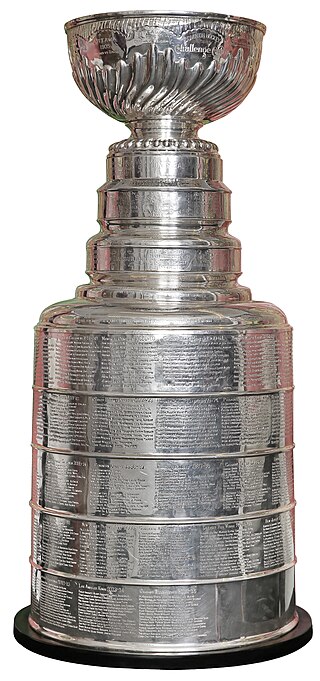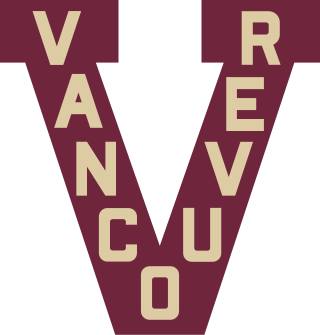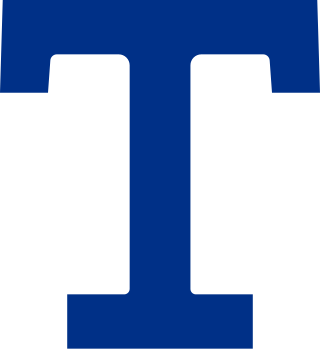Related Research Articles

The Stanley Cup is the championship trophy awarded annually to the National Hockey League (NHL) playoff champion. It is the oldest existing trophy to be awarded to a professional sports franchise in North America, and the International Ice Hockey Federation (IIHF) considers it to be one of the "most important championships available to the sport". The trophy was commissioned in 1892 as the Dominion Hockey Challenge Cup and is named after Lord Stanley of Preston, the Governor General of Canada, who donated it as an award to Canada's top-ranking amateur ice hockey club. The entire Stanley family supported the sport, the sons and daughters all playing and promoting the game. The first Cup was awarded in 1893 to the Montreal Hockey Club, and winners from 1893 to 1914 were determined by challenge games and league play. Professional teams first became eligible to challenge for the Stanley Cup in 1906. In 1915, the National Hockey Association (NHA) and the Pacific Coast Hockey Association (PCHA), the two main professional ice hockey organizations, reached an agreement in which their respective champions would face each other annually for the Stanley Cup. It was established as the de facto championship trophy of the NHL in 1926 and then the de jure NHL championship prize in 1947.
The National Hockey Association (NHA), initially the National Hockey Association of Canada Limited, was a professional ice hockey organization with teams in Ontario and Quebec, Canada. It is the direct predecessor of today's National Hockey League (NHL) and much of the business processes of the NHL today are based on the NHA. Founded in 1909 by Ambrose O'Brien, the NHA introduced 'six-man hockey' by removing the 'rover' position in 1911. During its lifetime, the league coped with competition for players with the rival Pacific Coast Hockey Association (PCHA), the enlistment of players for World War I and disagreements between owners. The disagreements between owners came to a head in 1917, when the NHA suspended operations in order to get rid of an unwanted owner, Eddie Livingstone.
The Pacific Coast Hockey Association (PCHA) was a professional ice hockey league in western Canada and the western United States, which operated from 1911 to 1924 when it then merged with the Western Canada Hockey League (WCHL). The PCHA was considered to be a major league of ice hockey and was important in the development of the sport of professional ice hockey through its innovations.
The 1917–18 NHL season was the first season of the National Hockey League (NHL) professional ice hockey league. The league was formed after the suspension of the National Hockey Association (NHA). Play was held in two halves, December 19 to February 4, and February 6 to March 6. The Canadiens won the first half, and Toronto the second half. The season was contested by four teams, down from six in the previous season, finishing with only three, in Montreal, Ottawa and Toronto. The Montreal Wanderers withdrew early in January 1918 after their rink, the Westmount Arena, burned down. Toronto won the NHL playoff and then won the Stanley Cup, by defeating the PCHA's Vancouver Millionaires three games to two in a best-of-five series.

The Vancouver Millionaires were a professional ice hockey team that competed in the Pacific Coast Hockey Association and the Western Canada Hockey League between 1911 and 1926. Based in Vancouver, British Columbia, they played in Denman Arena, the first artificial ice surface in Canada and the largest indoor ice rink in the world at the time it opened.
The Seattle Metropolitans were a professional ice hockey team based in Seattle, Washington, playing in the Pacific Coast Hockey Association (PCHA) from 1915 to 1924. During their nine seasons, the Metropolitans were the PCHA's most successful franchise, as they went 112–96–2 in their nine years as a franchise. The Metropolitans also won the most regular season PCHA championships, winning five times, with Seattle finishing second on three other occasions. The Metropolitans played their home games at the 2,500 seat Seattle Ice Arena located downtown at 5th and University.

The Toronto Hockey Club, known as the Torontos and the Toronto Blueshirts, was a professional ice hockey team based in Toronto. They were a member of the National Hockey Association (NHA). The club was founded in 1911 and began operations in 1912. The club won its sole Stanley Cup championship in 1914.
The 1919–20 NHL season was the third season of the National Hockey League (NHL). A Quebec team was activated by the NHL, increasing the number of teams to four. The four teams played 24 games in a split-schedule format. The Ottawa Senators won the league championship by winning both halves of the split-season. The Senators went on to win the Stanley Cup for the first time since the Cup challenge era ended and their eighth time overall, by defeating the PCHA's Seattle Metropolitans three games to two in a best-of-five series in the Stanley Cup Finals.
The Western Canada Hockey League (WCHL), founded in 1921, was a major professional ice hockey league originally based in the prairies of Canada. It was renamed the Western Hockey League (WHL) in 1925 and disbanded in 1926.

Frank Corbett "Flash" Foyston was a Canadian professional ice hockey player and coach. Foyston was a member of Stanley Cup championship teams three times: with the Toronto Blueshirts in 1914, the Seattle Metropolitans in 1917, and the Victoria Cougars in 1925. While with the Metropolitans, he twice led the Pacific Coast Hockey Association (PCHA) in goals. After his retirement from playing, Foyston became a minor league head coach. He was inducted into the Hockey Hall of Fame in 1958.

John Phillip "Jack" Walker was a Canadian professional ice hockey forward who played for the Toronto Blueshirts, Seattle Metropolitans, Victoria Cougars, and Detroit Cougars. He played in all the big professional leagues at the time: the National Hockey Association (NHA), Pacific Coast Hockey Association (PCHA), Western Canada Hockey League (WCHL), and National Hockey League (NHL).
The Stanley Cup Finals in ice hockey is the National Hockey League's (NHL) annual championship series. The winner is awarded the Stanley Cup, North America's oldest professional sports trophy, and one of the "most important championships available to the sport [of ice hockey]" according to the International Ice Hockey Federation.
The 1918 Stanley Cup Finals was contested by the National Hockey League (NHL) champion Toronto and the Pacific Coast Hockey Association (PCHA) champion Vancouver Millionaires. In a series held entirely in Toronto, the Toronto team won the series by three games to two in the best-of-five game series to win the Stanley Cup. It was the first series contested by the new NHL and subsequently the first Stanley Cup win by the Toronto NHL franchise team.
The 1914–15 NHA season was the sixth season of the National Hockey Association and played from December 26, 1914, until March 3, 1915. Each team played 20 games. The Ottawa Senators won the NHA championship in a two-game, total goal playoff against the Montreal Wanderers. The Senators, however fell to the Vancouver Millionaires of the Pacific Coast Hockey Association in the Stanley Cup championship. It was the second 'World's Series' between the NHA and the PCHA for the Stanley Cup.

The 1913–14 NHA season was the fifth season of the National Hockey Association (NHA). At the end of the regular season, a tie for first place necessitated a playoff to determine the championship. The Toronto Hockey Club defeated the Montreal Canadiens 6–2 in a two-game, total-goals playoff. The Torontos then played the Victoria Aristocrats of the Pacific Coast Hockey Association (PCHA) in the first Stanley Cup 'World's Series' between the leagues.
The 1913–14 PCHA season was the third season of the professional men's ice hockey Pacific Coast Hockey Association league. Season play ran from December 5, 1913, until February 24, 1914. Like the previous two seasons, teams were to play a 16-game schedule, but one game was cancelled. The Victoria Aristocrats club would be the PCHA champions. After the season, Victoria travelled to Toronto to play the Toronto Hockey Club, National Hockey Association (NHA) champions, in a challenge series for the 1914 Stanley Cup. Toronto won the series.
The 1914–15 PCHA season was the fourth season of the professional men's ice hockey Pacific Coast Hockey Association league. Season play ran from December 8, 1914, until March 9, 1915. The schedule was made for each team to play 18 games, but like the previous three seasons, one game was cancelled. The Vancouver Millionaires club were the PCHA champions. After the season the club faced off against the Ottawa Senators, NHA champions for the Stanley Cup, winning the series and becoming the first west-coast team to win the Cup.
The 1915–16 PCHA season was the fifth season of the professional men's ice hockey Pacific Coast Hockey Association league. Season play ran from December 7, 1915, until February 25, 1916. Each team would play 18 games. The Portland Rosebuds club would be PCHA champions. After the season the club would play the Stanley Cup Finals series against the Montreal Canadiens, NHA champions. Montreal would win the best-of-five series 3–2 to win the Cup.
The 1916–17 PCHA season was the sixth season of the professional men's ice hockey Pacific Coast Hockey Association league. Season play ran from December 1, 1916, until March 2, 1917. The season was expanded to 24 games per team, except that the final game was cancelled. The Seattle Metropolitans club would be PCHA champions. After the season the club would play the Stanley Cup finals series against the Montreal Canadiens, NHA champions. Seattle would win the best-of-five series 3–1 to win the Cup.